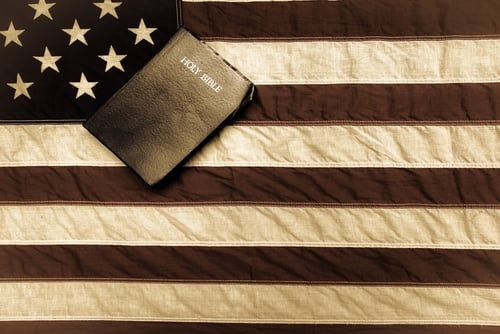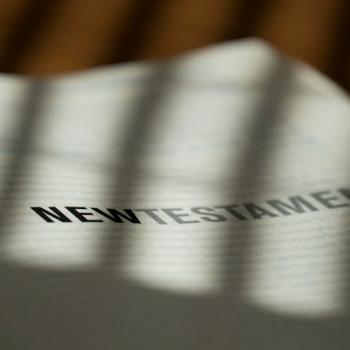
Recently, Christianity Today published results of a LifeWay research poll stating that 57% of American protestants prefer to attend church with people who share their political beliefs. While this doesn’t mean denominations are going to be rushing out to set up politically segregated congregations anytime soon (well, not officially), it shines a light on our divided culture and, more importantly, on what we value in church.
I can understand why many Christians instinctively prefer to worship and serve alongside people who cast the same votes. We often surround ourselves with those who share our beliefs and interests; it’s why parents usually form friendships with other parents, and why single folk tend to form friendships with other non-marrieds. Politics speak so deeply to the most important aspects of our lives and our beliefs in how we should serve each other that we might even think it’s a given that Christians should be uniform in their politics — and, of course, we’ll say it’s probably ours that they should flock toward (a majority of the poll’s respondents assumed that their fellow church members share their political beliefs).
But I think a desire for politics-based church and our inclination to surround ourselves with people who believe the same way we do about governance — or even, really any other non-salvific concern — is unwise. In fact, I think Christians who make it a priority to worship alongside believers who share their political beliefs have a fundamental misunderstanding of the Church and why we gather to worship, learn and serve together.
Our identity is in Christ
I’ve never been fond of divided services. I understand that congregations are often grouped by ethnicity, cultural differences or simply to accommodate a large membership in a small building. But I believe that should be the exception, not the rule.
The New Testament emphasizes diversity in the body of Christ. One of the major shifts that happened with Christ’s death and resurrection was the opening up of God’s promises to Gentiles, not just the Jews. The throne of God is where people from all tribes and tongues gather to worship together. The church (and, of course, life in general) is where we practice for that day.
Like I said, there are times when division is necessary. An immigrant congregation composed of Japanese speakers might need its own service or church home so the Gospel can be preached without barriers to understanding. Churches in areas with heavy ethnic groupings might look fairly uniform because of the makeup of the community. And, of course, denominations exist so that we can worship together without spending all of our time arguing about theological minutiae. But, again, these are our exceptions.
The reason why is because, when we gather together as the Body, we celebrate that our identity is rooted in Christ alone.
A common description of Christ has often been “God with skin on.” If you want to know what God is like, you look at Christ. You see his compassion, his kindness, his love and his power. When he ascended back to Heaven, the church was left to continue his work on Earth. And so, in a perfect world, if someone were to ask, “What is Christ like,” the answer would be “look at the church.”
Of course, that’s an imperfect description. We’re not in a perfect world, and members of the church often do not look much like Christ. But our aspiration should be the same: To model Christ to a watching world. One of the ways we do that is to model what binds us. It’s not politics, it’s not worship style, it’s not race. We are united in Christ. To split the church among political lines or to choose only to worship alongside those who share our ideology is to claim identification through something other than Christ. Instead, we put our man-made barriers down, embrace our differences and show the multifaceted beauty of Jesus when we congregate together.
We are too comfortable
Of course, I understand why people might be more inclined to share the pews with people who think and vote the same way. It’s why we choose churches based on worship and preaching styles, children’s programs, or amenities like coffee shops and bookstores. It’s because we’re consumers at heart, and we approach church with the same mindset with which we approach finding a new restaurant or pair of shoes.
We want a comfortable church that caters to our interests. We huff and puff about music styles, complain that the coffee is weak, or that there isn’t a good selection of toys in the nursery. And what could make us more uncomfortable than attending church with people who are outspoken about political beliefs that don’t jibe with our own?
Listen, I get it. There are political views that I vehemently disagree with, to the point where my reflex is to lose respect or feel my anger rising when I hear someone holds them. I’m not saying that’s a right response; the fault is my own pretension and pride, not the fact that they hold a particular view. And if I let this anger get to me, it can override everything else, hindering relationships that would otherwise flourish.
But comfort isn’t the measure by which we choose a church, nor should lack of it necessarily be a reason for leaving. There’s a sense in which church is not truly church unless you are sometimes uncomfortable, be it because of the conviction of the Holy Spirit, service and fellowship that pushes you outside of your comfort zone, or humbling yourself to worship alongside those who drive you nuts (there’s also a good chance you drive them nuts). I remember very few of the sermons that left me feeling elated; I remember the days I left church feeling beaten up.
It’s because of what I mentioned before above. The church is created to model Christ, but we do it imperfectly. The way we change is through sanctifying relationships. And if we all looked the same and believed the same and blissfully existed without any thought of changing, nothing would happen. Instead, we are brought into conflict, we challenge each other, we push against each other. This is uncomfortable, both because we don’t like conflict and because we don’t like our sins to be made apparent, especially to us. But it’s deeply necessary.
The truth we hate to acknowledge is that Church proves that not only do we need God, but we also need each other. If we are sinners whose moral compass is off track from birth, then one of the ways we begin to change is from learning from and living alongside other people.
Divided services don’t work because of this need we have. I had a pastor who used to say that we didn’t have a contemporary or traditional worship service because we needed both represented in the service. We needed to sing the the traditional hymns of the faith because those were our roots, and the young people needed to know those roots existed and had been there long before them. The younger members also needed to worship alongside those who had blazed a trail for them. But we need contemporary songs because that older generation needs to see that the message is still vital and being carried on; new things are being created through it, and it’s not simply gathering cobwebs or being treated with kid gloves.
We can’t separate on ethnic or class lines because of this same reason. Every culture showcases something unique and beautiful about the Gospel. Cultural traditions show us new ways people have been prompted to worship God, and remind us that our faith transcends class, racial and national lines. Church doesn’t look the same in American, Chinese or African cultures, and yet we are all members of the same body. And when we worship alongside brothers and sisters who are marginalized, mistreated and ignored, it can convict our oft-privileged hearts to move into action, defend their cause and make change.
And so, politically, we must have diversity in the church as well. The church is not red and it’s not blue; it’s purple. There’s biblical basis for supporting some conservative issues as well as liberal ones. The church needs the hawk and the peacemaker. It needs the environmentalist and the fiscal conservative, the defender of unborn life and those who love and serve the LGBTQ community. It needs those who want stronger gun control and those who want to protect traditional marriage. And if you’re squirming because of a group I listed: that’s the point.
Now, I’m not saying there aren’t sinful ways to be political or positions that are objectively antithetical to biblical teachings. There are times when we will be wrong and need to repent of our political positions and the way we idolize power, and there are times when we will need to stand firm in love and call our brothers and sisters to account. That does not negate my point; it reinforces the need for political diversity in the church.
The Gospel informs but ultimately transcends our politics. If we are following Christ, there will be times when the Bible supports our chosen party and times when it is opposed to its policies. If we are identified not as Republicans, Democrats or even Americans, but as followers of Christ, we need to loosen our grip on our political stances and be willing to accept that sometimes the Bible will oppose them. And that’s when we need those who hold different views to come alongside us as we search for a solution.
It’s not that Christians shouldn’t be political. It’s that our political views must be subservient to the Kingdom. And the way we begin to take Kingdom values and put them to work in our world begins in our churches, where we live and work together, united not by politics but by the cross.

















